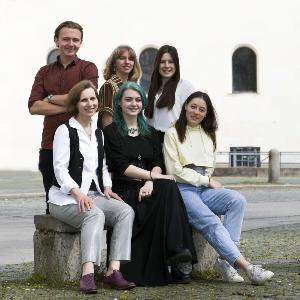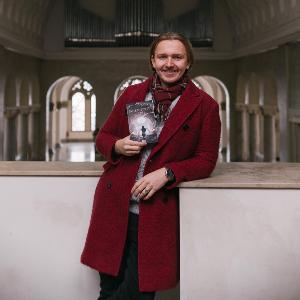Welcome to the world of the Fantastic LMU!
4 Mar 2024
Inspired by their experiences here at the university, LMU students have written a series of short stories that play out on the LMU campus.
4 Mar 2024
Inspired by their experiences here at the university, LMU students have written a series of short stories that play out on the LMU campus.
If you get wind of weird monsters pacing around LMU and hunting for students, of trees growing suddenly in the atrium, of skeletons asking for a dance in the biology labs, then don’t worry! It is not actually happening in the venerable halls of LMU Munich, but in the cosmos known as Fantastische LMU (Fantastic LMU) – an anthology of short stories penned by six LMU students.
In summer 2022, the Kreativ Schreiben! (Creative Writing) course run by the Writing Center at LMU Munich marked the beginning of a project that comprised a total of twelve stories. Rooted in a variety of study disciplines, the authors got to know each other on the course and quickly decided to continue pooling their creativity even after it had ended. Thus was born the idea for the anthology. All that was needed was a few short stories – which is no easy task: "The process was rather chaotic at times," admits author and editor Nikodem Skrobisz. “One of the writers, Zsófia Meggyesi, was doing a semester abroad at the time and was only able to hand in her story later on.”

The LMU students Petra Teichert, Natascha N. Druschba, Xenia Taufertshöfer, Julia Dörner, Zsófia Meggyesi and Nikodem Skrobisz take you into the world of the Fantastic LMU. | © J. Druschba
The authors describe the underlying genre as a colorful potpourri of fantasy, horror, mystery and dark academia whose common denominator is the venue: the LMU campus. “We opted for fantasy because some of us already write along similar lines. But for many of us, this was a completely new experience,” Skrobisz explains. “Natascha N. Druschba, for example, has written stories that lean strongly toward fantasy, whereas I, as a philosophy student, tended to contribute more philosophical pieces.” Julia Dörner, who recently finished studying law at LMU, adds her own perspective: “Dark academia also explores the sinister side of a fascination with knowledge and academic life. I think this comes out in many of our stories, often tinged with smaller elements of fantasy.”
No short story would be complete without a dash of humor, however. In one of the texts (intended as a parody), a crocodile appears in the lecture theater. And since the only student who is present is so preoccupied with wondering why there is a crocodile in the room, he doesn’t notice that the creature is biting his leg off. “We have a couple of really serious stories dealing with major themes such as justice and what holds the world together,” Skrobisz notes. “But there are also stories that are rather less heavy and add a touch of comic relief.”
Skrobisz insists that the project never aimed to get participants to churn out short stories of the same kind. “What sets the anthology apart is that the six of us are different authors, each with our own approach and each contributing our own favorite genre,” he explains. All those involved were nevertheless guided by one and the same question: How would it be if fantastical or supernatural things were to take place at this university?

Philosophy student Nikodem Skrobisz has contributed four stories to the anthology. | © LMU
Many of them took inspiration from everyday life at LMU, as Julia Dörner says. “The central theme was often a single event or a particular experience, be it from the perspective of a professor or that of a student who then has to learn a new skill or engage in some other fantastical practice in order to solve a problem.” The writers then channeled these everyday experiences into the vernacular of Fantastic LMU. The procrastination that is so widely feared, for example, took on the nature of a monster from which everyone had to flee. Alternatively, the desperate search for room U13 became a quest to find the meaning of life.
“We write about our shared environment,” Skrobisz says, “making it larger than life with aspects that we all know from the university routine. And then we transform that all into metaphorical monsters.” Seen from this angle, Fantastic LMU also reflects on student life at LMU, “just a bit overdramatized in the form of fiction,” as Skrobisz puts it. The cover too – depicting the atrium enhanced by magical lighting effects and ornate decorative elements – clearly symbolizes the same approach. “The atrium was probably the biggest inspiration for all of us,” comments Xenia Taufertshöfer, the design graduate who crafted the cover.
What brings the short stories to life is that LMU itself sets the stage. “There are one or two places here where you really do get a bit of a Harry Potter vibe,” Taufertshöfer smiles. “You get a feel for the world of academia that once was.” Every reader who knows the main building will be able to see in their mind’s eye where the protagonists are moving around at any given moment – in the colonnades, for example, or on one of the imposing stone staircases. “We consciously chose the historic part of the campus as the scene because it fits perfectly with the atmosphere and presupposes a bit of inside knowledge. That is part of the charm of these stories,” Skrobisz explains. “And we also want to get people from outside excited about LMU.”
The individual spots were picked by the writers more or less at random, mostly depending on where they encountered their own moments of inspiration. “We often met together somewhere or other around the university. We once even did a journey of discovery through the main building,” Skrobisz relates. “In a way this helped us get to see and know our university through new eyes.” Another special aspect of the project was that the book grew out of a circle of friends: “We were able to work together as friends, which was one reason why it was so much fun.”
The Creative Writing course laid on by LMU’s Writing Center obviously did more than simply bring the six authors together: It also provided creative support for the writing process. “Each lesson in the course addressed a different topic,” Julia Dörner explains. “Sometimes it was writing letters. Sometimes we drew lots and picked out a certain genre in which we then joined together to write something. And so on. That forced us to write things we wouldn’t normally have written. That was how I first came into contact with the fantasy genre, although it is not really my thing.”
By “overcoming barriers”, as the participants also put it, the course helped them broaden their horizons. It also stimulated their imagination. “The various creativity exercises were hugely inspiring,” says an enthusiastic Xenia Taufertshöfer. “I’ve still got so many ideas for more stories in the back of my mind.”
At the end of the writing course, the participants hosted a public reading of the texts they had produced. This served as good practice for Fantastic LMU – for which they have already staged two further readings. Some 60 people attended each of the latter highly successful events, which proved an enriching way to celebrate their joint publication. There are no plans for any more public readings until the next book comes out: The friends are already working on their second anthology. This time, they have cast the net a little wider, with the stories set in summertime Munich. And this time there are only a few fantasy narratives. On the other hand, a number of new authors who are also fellow students are now on board as well. The manuscripts are currently being reviewed. The writers want everything to be ready by the time the Leipzig Book Fair begins in March, so that they can use this occasion to go looking for a publisher.
For writing enthusiasts: From 4 to 8 March 2024 the Writing Centre will take over LMU's Instagram Takeover account and present its activities.